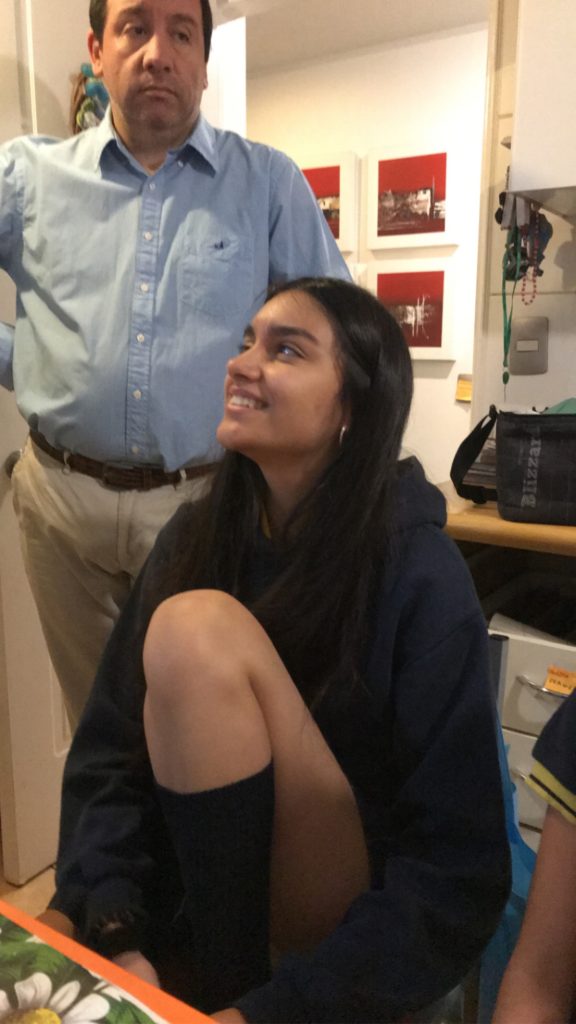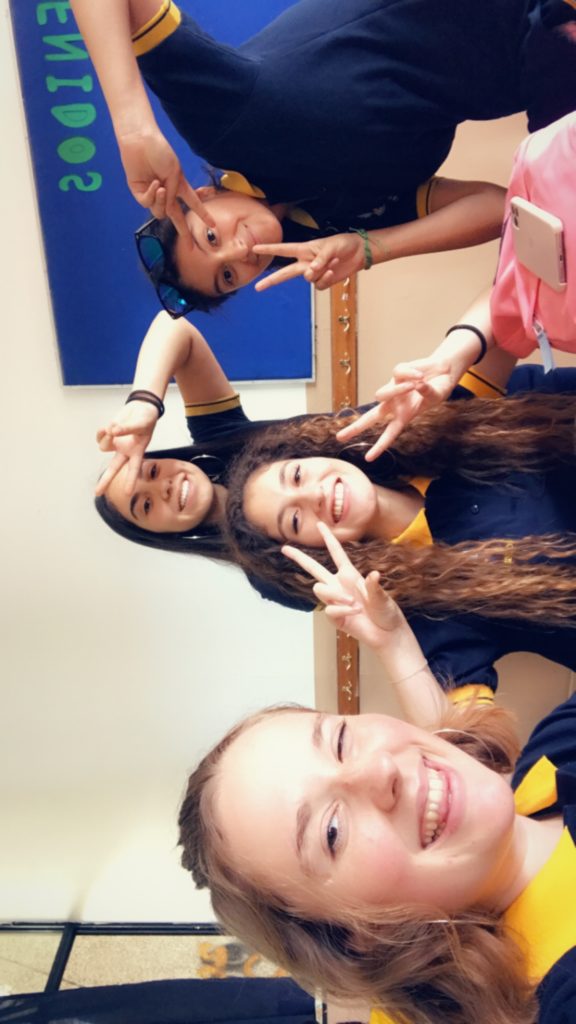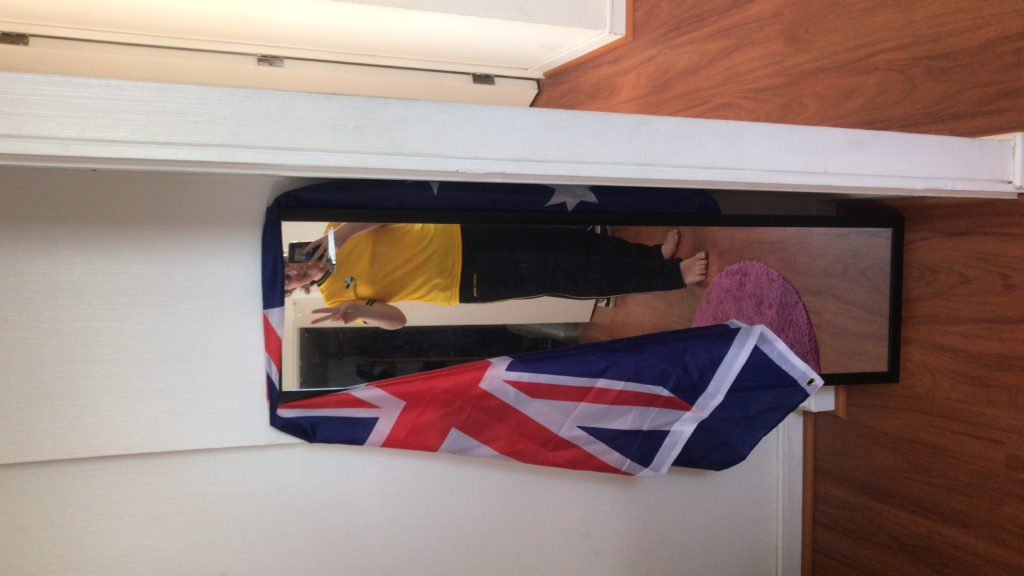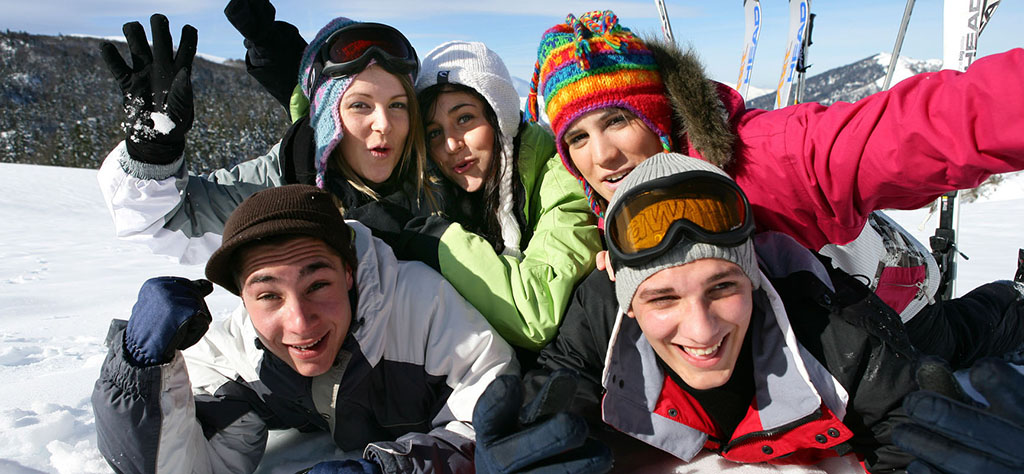Hi everyone! After a long period of amazing holidays, I have (un?)fortunately started school! It’s been just about a week so far, so everything is still a little new. I go to Colegio Mayor Peñalolen, a private school in Peñalolen, pretty close to where I live. I’m in the Australian year 11 equivalent; Tercero Medio.
I wake up for an average day of school at about 6am (more or less, my alarm goes off at 5:45, but a snooze button exists), and I get dressed in my uniform and all ready. We all have ‘breakfast’ together in the mornings, but because it’s all a bit rushed, we don’t usually get very much more than a cup of coffee and a slice of toast in. We leave the house at 7am, and my host mum drives my host siblings and I to school.

Actual school starts at 8am, and normally finishes at around 3:30pm. For the past week, everyone has kind of been easing into the school routine, and so school has finished at 1pm everyday. I catch the Microbus (just a normal bus) with my eldest host sister and host brother home from school. Technically, we do have to pay for the bus, but there’s a way around it by just saying ‘Permiso, gracias’ (permission, thank you), and the bus driver will let you one without having to pay. It’s very common and normal, and since students here still have to pay pretty much full prices, I’m not really going out of my way to not use ‘permiso’ (sorry not sorry mum).
The schooling system is Chile is quite different to Australia, but it does has it’s similarities. Chile’s school years work with the calendar year, the same as Australia, however they start in March and finish in mid-December. Chilean school has two semesters each year, both 18 weeks long. In between, there’s about a week of holidays in July. The big holidays in the year are from mid-December until March, when they get 2 1/2 months of holidays.
Chileans start school at about 3 or 4 in Playgroup, and then they have Kinder and Pre-kinder before they start Basico (grade/primary/elementary school, whatever you call it in English). Básico goes from year one until year 8, and is followed by Medio, which has year 9-12, however they start counting again, so it’s years 1-4 Medio.
If it’s still a bit confusing, in order it goes:
Playgroup (age 3/4)
Kinder (age 4/5)
Pre-Kinder (age 5/6)
Primero Básico (year 1, age 6/7)
Segundo Básico (year 2, age 7/8)
Tercero Básico (year 3, age 8/9)
Cuarto Básico (year 4, age 9/10)
Quinto Básico (year 5, age 10/11)
Sexto Básico (year 6, age 11/12)
Séptimo Básico (year 7, age 12/13)
Octavo Básico (year 8, age 13/14)
Primero Medio (year 9, age 14/15)
Segundo Medio (year 10, age 15/16)
Tercero Medio (year 11, age 16/17 – me!)
Cuarto Medio (year 12, age 17/18)
In my school (I’m not sure if it’s like this at every school), everyone within their Curso (year at school), is placed into a class, either A, B, C or D. For example, I’m in Curso Tercero A, so I’m in year 11, class A. The clases aren’t graded or anything, they are just placements. Something that surprised me though was that here everyone is in the same class all the way from Primero Básico until you graduate Cuarto Medio, which is so different from Australia. Every class has their own classroom, and for all non-elective clases, everyone stays in that class and the teacher comes to that class to teach. For elective clases, each elective subject has a specific classroom, and the students move to that classroom when they have that elective.
For my electives this year, I chose Educación Física (Physical Education, basically), Literatura (Literature), Filosofía Política (Political Philosophy, but it’s more like a mix of social sciences and philosophy) and Artes (Visual Art). For these classes I have to get up and move to a different classroom, and I have a different group of people in my class from my normal Tercero A class. For the subjects Lenguaje (Spanish Language), Matemática (Mathematics), Inglés (English second language), Filosofía (Philosophy – different to Filosofía Política), Ciencia Ciudadanía (mix between science, social science and geography), and Educación Ciudadana (mix between social science and history), I sit in the same classroom with my Tercero A class.

Periods (as in the school subject kind, not the vagina kind) at school are about 80 minutes, and after every one we have a 15 minute break, called Recreo. Recreo is quite different from the recess and lunch I’m used to at my school in Sydney. There’s 3 15 minute Recreo’s during the day, and then Almorzar (lunch) that goes for 45 minutes, and during them everyone just mills about in the classroom or out on the balcony (my school is 3 stories high, I’m on the top floor) just talking and eating, or playing Reggaetón music from the speakers until the teachers come and turn them off. I like the breaks here because normally we can all have a bit of a dance to the music or just chill out, and it definitely helps get me through the school day.
Chile’s school certificate is called a PSU (La Prueba de Selección Universitaria – ‘the university selection test), and it’s pretty similar to the HSC exams or ATAR. Basically, this one exam determines whether they can enter University in Chile or not, and it’s quite important for them. I’m not entirely sure how it works, but I know that there’s quite a bit of controversy around it currently, if you’re interested you can have a bit of a google about it.
There have been many differences between school here and in Australia, here are some I didn’t know how to incorporate and write eloquently into this blog post, so I thought I’d do them in dot points:
- In Latin American culture generally, everyone likes to hug and kiss a bit more than Australian culture, and greetings are usually kisses on the cheek, and there are almost no boundaries for PDA in a romantic relationship. What really surprised me is how this openness to platonic physical affection even showed up in the classroom, like how it’s not uncommon for students and teachers to greet each other with a hug or a kiss on the cheek. Coming from Australia where teacher can almost never even touch children, it was a bit odd for me at first. As well, it’s not uncommon to see friends (of all sexes and gender expressions) just hugging and holding hands, and it’s not a big deal
- There is a very relaxed environment about learning, however everyone here actually respects all of their teachers and their class time, and that was also a shock to me. Everyone is relatively quiet when the teacher is teaching, and generally paying attention to the lessons. I almost never saw that happen in Australia, with so many people being very blatantly rude to teachers and disrespecting equipment in the classroom and more. Here, because there is that level of respect, I haven’t had a single teacher yell at the class or get angry at all, and that would be almost an hourly occurrence in Australia. Of course, we are still teenagers, and we are human, and we aren’t going to want to pay attention in all classes and I’m not sure if it’s just the teachers respect that or that they don’t care, but you don’t get in to trouble if you disengage with class a bit, just as long as you aren’t asleep or disruptive. I think this is a really good approach to learning, because everyone has their bad days, and if you’re forced to be in a place for 8 hours straight and in a subject you don’t like, it’s hard to always focus for long periods of time, and you need a bit of a break. If you miss out on the content of one lesson, the world isn’t going to collapse, and you can pick up the slack once you’re feeling better. Maybe it’s my teenage naïvety talking here, and you’re entitled to your own opinion about it.
- There aren’t any laptops in the classroom, and other than a powerpoint in some classes, a lot of the time there’s no technology in class. Everyone has a cuaderno (notebook) and a lapis (pen) and they take notes on what the teacher is saying and writing on the white board. Of course, it’s the 21st century and smart phones exist, and we are Gen Z, so everyone does have their phone in class. But, for the most part, people only really use them during Recreo or when they’re asked to search something. I do use my phone a bit in class, but mostly to translate a word I don’t recognise, or translate something I just can’t for the life of me figure out myself.
- Schools in Chile usually have some sort of uniform, but the uniform regulations are a lot less strict than in Australia, and I think that it’s a lot better here. I do understand the benefits of creating equality between everyone in school with a uniform, but there’s also an aspect of individuality that can be achieved while also having that unity. There aren’t any regulations on what jewellery, make up or hairstyle you can wear to school, and you can fiddle and adjust the uniform however you want it (like cuffing the long pants so that they fit better or tucking in the shirt, etc, the only thing they actually police is the length of your skirt – which has some negative connotations I won’t go into here). Also, the uniform is very practical in itself, with a comfortable polo top (not a blouse, like I have in Australia, so I can actually move my arms in my shirt at school! Phenomenal!) and an option for long pants or a skirt. For socks, they don’t mind too much, but the uniform sock just has to be dark blue, the length and style is up to you. For shoes, they’ve only really got to be black, but they don’t care too much. The school jumper is a hoodie as well, and in Cuarto Medio, you get a specialised graduating hoodie, and I approve of this very much so. I think the ability to adapt the uniform to suit the person is how a uniform should be approached; a thing that unifies everyone and connects them, but doesn’t make them carbon copies or restrict them. Also, every friday is ‘Jeans Day’, or Mufti Day/Free Dress day, and you can wear whatever you want to school. I like this a lot (no surprises there)
- Before you go into the toilet stall, you have to grab your toilet paper. There’s one roll of toilet paper just outside of the stalls, and everyone uses that one, grabbing a few sheets before they do their business
- You can literally eat whenever you want, and no one really minds. You can eat during class, in the breaks, on the bus, and if you’ve got a good teacher (shout out to my art teacher, Saúl) you can even eat the teachers food. The first art lesson I had, there were about 3 people drinking from my teachers tea cup, and in return they gave him one of their oreos. I mean, it’s not great in the spread of Coronavirus/COVID-19, but they’ve given us all hand sanitiser in every lesson, so that’s something, right?

I’ve made quite a few friends at school and I’m enjoying my time there (I know, it’s unbelievable, a teenager enjoying school? How unheard of!). It’s helping me learn Spanish a lot quicker and keeping me busy, so I don’t have many complaints (other than early mornings, but I mean that’s a bit of a me problem). Thank you for reading!
Update: I wrote this blog post a few days before posting it today, and at the time my school wasn’t affected by Covid-19/Coronavirus. Currently, there are discussions about whether all schools will be closed in Chile for a while because of the virus, and the verdict will come out in a few days. I might make another blog post about that later when I know more, otherwise I might update on Facebook. Don’t stress though – everything is going to be fine in the end, and if it isn’t fine yet, it isn’t the end!




Mufti Friday (every.Friday…heaven), respect for teachers (THANK YOU!!!), school is good (best time of your teenage life), comfortable school uniform (no uniform notes?!), hugging & kissing teachers (yep that’s a cultural thing), sharing a cuppa tea…NOOOOOOO!!!
Enjoy my beautiful girl! Stay safe!!!!
THS is still open so Mae’s ‘ready’ to go to school.
Great informative blog Zoe. Lovin the respect teachers receive and the openness/relaxed style of teaching. Sounds like your having a blast, well done you & your host family. A relaxed space to grow experience & love. Enjoy Nannie x